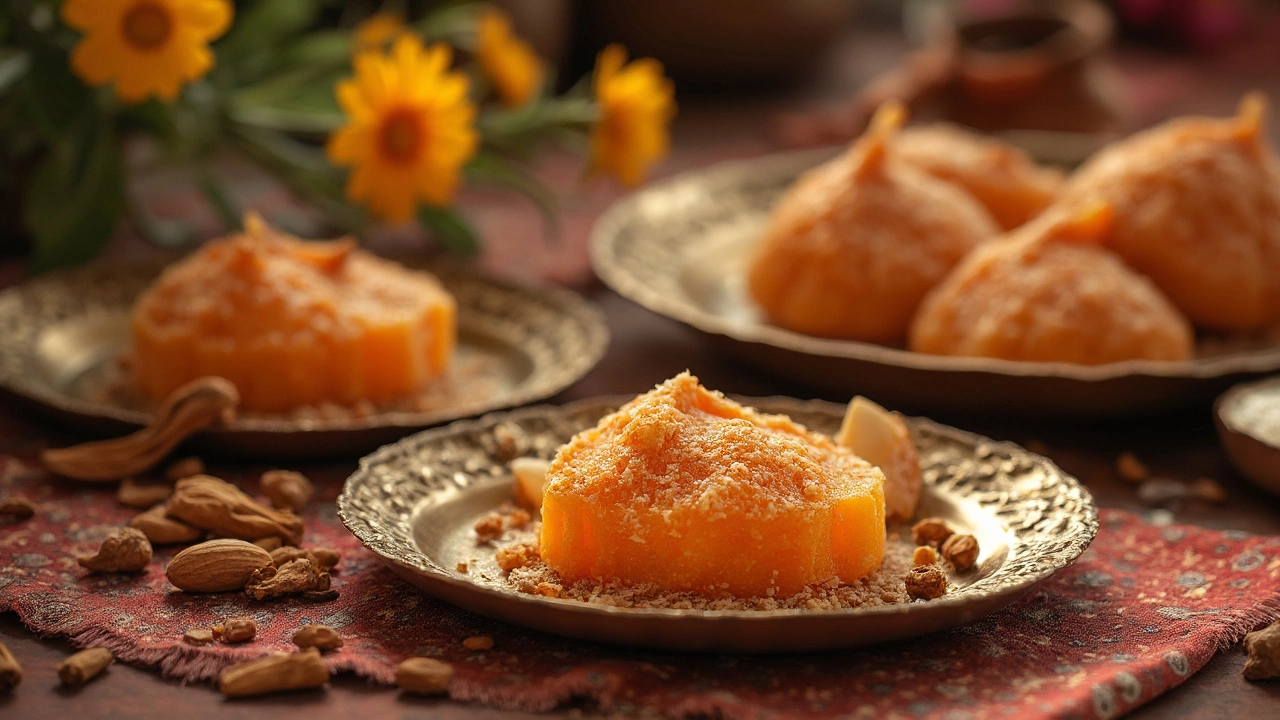When you think of Indian sweets, you probably imagine rich, sugary delights that are hard to resist. But what if you could indulge in these tasty treats without compromising your health? It's not a distant dream. Some Indian desserts strike a balance between flavor and nutrition, making them a fantastic choice for health-conscious sweet lovers.
Before we get into the specifics, it's important to understand the basics of what makes an Indian sweet healthy. The right ingredients play a crucial role. While traditional desserts often use refined sugar and ghee, more modern twists introduce healthier alternatives like jaggery and coconut oil.
It might surprise you, but a few tweaks in preparation can transform a typical Indian dessert into something your body will thank you for. Stay tuned as we unravel the secrets to enjoying sweets that are as kind to your waistline as they are to your taste buds.
- Understanding the Basics of Indian Sweets
- Ingredients That Make a Difference
- Rethinking Sugar in Sweets
- A Closer Look at the Healthiest Options
- Making a Healthy Indian Sweet at Home
Understanding the Basics of Indian Sweets
Indian sweets, often called 'mithai', are more than just a treat—they're deeply rooted in India's culture and tradition. You'll find a wide variety of these Indian sweets across the country, each with its unique flavor and preparation method. From North to South, each region boasts its specialities, influenced by local ingredients and culinary practices.
Common Ingredients
The key to understanding these sweets lies in their ingredients. Traditional recipes use ghee, sugar, milk, and flour—but things are changing. Healthier versions now replace refined sugar with natural sweeteners like jaggery or honey and use whole grain flours. These swaps not only cut down on empty calories but also add a depth of flavor.Unlike the often overly processed desserts you'd find elsewhere, Indian sweets frequently incorporate simple, natural ingredients. Dairy products play a big role too, with items like khoya (reduced milk) and paneer (fresh cheese) forming the base for many delicacies.
Regional Varieties
Take a quick tour from the rich gulab jamun in the North to the lighter Mysore pak down South and you'll see this diversity firsthand. Each sweet has its own story and importance, often associated with festivals and celebrations. In West Bengal, the beloved rasgulla is a must at any celebration, while Maharashtra's puran poli finds its spot during special occasions.By the numbers, India produces an astonishing variety of sweets, with thousands of unique recipes spanning from household to household. Not every sweet can claim to be healthy, but when you understand the basics, you'll know where healthier choices lie.
Ultimately, whether you're in India or abroad, choosing a more nutritious option often means looking at what's inside the treat and how it's prepared. Next, we'll dive into specific ingredients that make a difference in the healthiness of these sweets.
Ingredients That Make a Difference
Whether you're a fan of traditional choices or newer interpretations, the ingredients in Indian sweets can significantly impact their health benefits. So, let's jump right in and see what's on the ingredient list.
Alternative Sweeteners
You might have heard of jaggery and honey as alternatives to refined sugar. Both options spike up the sweet factor while offering added minerals and a lower glycemic index, making your Indian dessert a tad healthier.
Jaggery, commonly used in various sweets, retains more nutrients compared to sugar. It's rich in iron and other minerals. Honey, on the other hand, brings antioxidants into the mix. Consider swapping refined sugar with these to boost your dessert's nutritional profile.
Healthy Fats
Traditional recipes often call for lots of ghee, which is delicious but calorie-dense. Opting for coconut oil or even smaller quantities of desi ghee can make a difference. Both alternatives provide those necessary fats without packing on too many calories.
Nuts and Seeds
Incorporating nuts like almonds, cashews, and pistachios can add both flavor and nutrition. They are a great source of healthy fats, protein, and minerals. Seeds such as sesame and sunflower can add a crunchy texture and nutritional boost. Don’t just sprinkle them on top—blend or grind them into your sweets for extra goodness.
Whole Grains and Fiber
Using whole-grain flour instead of refined flour can step up the fiber content. Think about including millet flour or whole wheat flour. These provide more fiber, keeping you fuller and more satisfied.
| Ingredient | Benefit |
|---|---|
| Jaggery | Rich in minerals, lower glycemic index |
| Coconut Oil | Healthy fats, enhances flavor |
| Nuts | Provides protein, healthy fats |
| Whole Grain Flour | Increases fiber content |
Remember, the key is to make conscious choices about the ingredients you choose. Little swaps here and there can ensure that your indulgence doesn't derail your health goals.

Rethinking Sugar in Sweets
Sugar is usually the bad guy when it comes to sweets. But what if we told you there are ways to enjoy Indian sweets without overloading on the sweet stuff? It all comes down to choosing the right kind of sugar and the right amounts.
Exploring Alternative Sweeteners
In traditional recipes, refined sugar is the go-to, which isn’t the best for your health. Luckily, there are some great alternatives!
- Jaggery: This natural sweetener comes from sugarcane or palm. Packed with minerals and a rich flavor, it brings sweetness with a nutritional punch.
- Honey: While it's still sugar, honey is less processed and contains antioxidants, making it a better choice. But remember, it's sweeter than sugar, so you need less.
- Coconut Sugar: Made from the sap of coconut palms, it has a lower glycemic index than regular sugar, meaning it won’t spike your blood sugar as much.
How Much is Too Much?
Even with these alternatives, moderation is key. A rough guide for a healthier dessert is to cut the sugar content by a third or even half.
Also, think about the dessert's purpose. Is it an everyday treat or a special occasion indulgence? Treating it as the latter helps keep sugar intake in check.
| Sugar Type | Glycemic Index | Minerals |
|---|---|---|
| Refined Sugar | 65 | Minimal |
| Jaggery | 54 | Iron, Calcium |
| Coconut Sugar | 35 | Potassium, Zinc |
So, next time you're whipping up your favorite sweet, consider these swaps to make them a bit more guilt-free. It's all about striking the right balance and making smart choices without sacrificing taste.
A Closer Look at the Healthiest Options
Let's dive right into some of the healthier Indian sweets that won't leave you feeling guilty. These delights strike just the right balance, letting you enjoy them without worry. But how do you choose the healthiest options?
1. Ladoo Made with Jaggery
Ladoos are a staple in Indian households. When they're made using jaggery instead of refined sugar, they've got a health edge. Jaggery is rich in iron and acts as a cleanser for your liver. Besan (chickpea flour) laddoos or sesame seed laddoos with jaggery are not only yummy but offer numerous health benefits too.
2. Coconut Barfi
Coconut is a hero ingredient in many sweet dishes. Coconut barfi, which is simple to make, can be packed with nutrients if you opt for fresh coconut and avoid too much sugar. Coconut contains medium-chain triglycerides that may boost metabolism and aid in weight loss.
3. Date and Nut Roll
If you're keen on a no-sugar option, a date and nut roll is a top pick. Dates naturally sweeten the dish while almonds and cashews add beneficial fats and proteins. It's like a power-packed energy bar in the form of a sweet!
4. Kheer with Brown Rice
Kheer is an all-time favorite, but classic recipes can be quite rich. Swap white rice for brown rice, use skimmed milk, and flavor it with a hint of cardamom and nuts. This version reduces the calorie count while retaining all the comfort.
5. Quinoa Kheer
Looking for a modern twist? Try kheer with quinoa. This grain is high in protein and fiber, making your dessert filling and nutritious. It's quite novel but gaining popularity for good reason.
These options aren't just about cutting calories; it's about adding nutrition to your desserts. So, next time you're eyeing those delectable Indian sweets, remember, with a few clever choices, you can treat yourself and your body right.

Making a Healthy Indian Sweet at Home
Creating healthy Indian sweets at home is easier than you might think. With a few smart swaps and mindful preparation, you can enjoy your favorite desserts without the guilt. Let’s take a look at how you can whip up a delightful treat while keeping it nutritious.
Choosing the Right Ingredients
The first step to making a healthier sweet is picking the right ingredients. Instead of refined sugar, opt for natural sweeteners like honey or jaggery. These add a deep, authentic sweetness without the overly processed junk. Replace traditional ghee with coconut oil for a lighter fat option.
Recipe: Healthy Coconut Ladoo
This simple recipe for Coconut Ladoo swaps out sugar for honey and uses shredded coconut, a great source of fiber.
- Ingredients:
- 2 cups shredded coconut
- 1/2 cup honey
- 1/4 cup coconut oil
- 1/4 cup almond powder
- 1/2 teaspoon cardamom powder
- Instructions:
- Start by warming the coconut oil in a pan over low heat.
- Add the shredded coconut and stir gently until it becomes fragrant.
- Mix in the almond powder and cardamom, then slowly pour in the honey.
- Continue to stir until everything blends into a sticky mixture.
- Once mixed well, remove it from heat and allow it to cool slightly.
- Roll small portions into round balls and refrigerate for about 30 minutes.
These little gems pack lots of flavors, and because they're homemade, you control the sweetness and quality of every ingredient.
Benefits of Homemade Sweets
Making desserts at home gives you the power to create something deliciously indulgent yet healthy. You avoid preservatives and artificial flavors often found in store-bought options.
| Sweetener | Calories per 100g |
|---|---|
| Refined Sugar | 387 |
| Jaggery | 383 |
| Honey | 304 |
Choosing natural sweeteners like jaggery not only reduces calories but also provides trace minerals not present in refined sugar, adding nutritional value to your treats.
